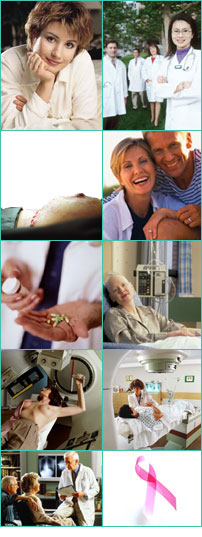Learning you have breast cancer is a very difficult thing to accept, but your attitude towards the disease and treatment has an enormous impact on your outcome. The first thing you need to do is be positive. Remember that breast cancer is not a death sentence! Tremendous progress in effectively treating cancer is being made each day. There are treatment options available to you. Allowing yourself to languish in despair only detracts you from overcoming the cancer and getting well.
After a diagnosis of breast cancer, a patient is overwhelmed with a tremendous amount of information — a pathology report, test results, treatment options, etc. Most of the time, newly diagnosed patients are not only anxious, but are on information-overload. Trying to digest everything your doctor tells you, or even remembering to ask your doctor about the questions you thought of the night before can seem next-to-impossible.
One of the best things you can do for yourself is to enlist a good friend or family member to be your co-pilot throughout the diagnosis/treatment consultation process. Bring them with you to your appointments, and let them take notes and keep track of questions and other bits of information. This way, even if you are too overwhelmed after the appointment to remember all that was said, they will remember.
Educating yourself about breast cancer also is important. Knowledge is very empowering. The more you understand about your breast cancer, the less frightening it becomes. Learn about your treatment options and what each one entails. This way, when it comes time to undergo a procedure or test, you will know what to expect, and the experience will be less stressful.
The very fact that you are educating yourself by visiting the healthsearches.org website is an important step! Many other valuable educational resources are available to you online and through telephone helplines, including:
National Cancer Institute (www.nci.nih.gov) (Public Information Office phone: 301-435-3848)
Susan G. Komen Breast Cancer Foundation (www.komen.org) (Tel: 800-IM AWARE)
SusanLoveMD.com (www.susanlovemd.com) (Tel: 310-230-1712)
Talking to other women in your situation also is an important first step. Although friends and family will be able to give you love and support, they cannot really understand what you are going through in the same way someone who is or has gone through it can. Genuine empathy can be very comforting.
One approach is to join a breast cancer support group in your local area. Going to a meeting does not mean you have to talk. Just go to listen to others’ experiences and feelings. Listening to others who are going through the same thing you are is also a great way to learn the “ins” and “outs” of different tests and treatments, like tips for dealing with treatment side effects and insights about intimacy after surgery.
The following organizations will be able to help you locate a breast cancer support group in your area:
American Cancer Society (www.cancer.org) (Toll-free phone: 1-800-ACS-2345)
Cancer Care, Inc. (www.cancercare.org) (Tel: 212-712-8400)
Another alternative for talking to other women with breast cancer is to visit a breast cancer-focused online chat room. |


